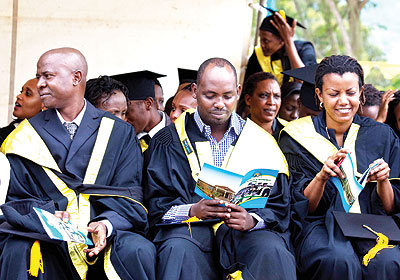By mid 60s most countries in the region had attained independence. Statistics available also show that each of the five East African countries had relatively low populations and also their Universities among the best in Africa.


By mid 60s most countries in the region had attained independence. Statistics available also show that each of the five East African countries had relatively low populations and also their Universities among the best in Africa.
So by 60s when we took over from the colonialists, intellectual consciousness (both about politics and the economy) was at its peak. This was a result of the influence that institutions of higher learning had on the main actors during the struggle for independence. There was almost zero or less unemployment to speak of.
Fast forward to the present day, populations have grown almost threefold; most of our countries have had their fair share of political instabilities. Because of these and many others problems, there has not been a strategic effort to create opportunities especially for our graduates.
It was always assumed that one would get a job after school, an assumption that is currently flawed. Currently biggest challenge facing our governments is unemployment especially for the youth since they are the ones leaving school.
One can advance many factors to explain the current unemployment problem. However, my interest here is the role institutions of higher learning can play in providing solutions.
During the transition period(from independence till today), while politicians continuously rebranded themselves to remain relevant to their market (the voters) and hence retain power, Higher learning institutions remained stuck in the glory of the past.
There was no conscious effort to design the kind of brand, a student of the future considering that the dynamics in the job market were rapidly changing. The sole purpose of Institutions of higher learning is to educate and also train people to serve their communities in different capacities.
It’s also to equip students with the necessary skills that can enable one make a living. Here in actual sense they act as a system or an engine of sorts where the students are inputs. So increasing unemployment problems means that the system has a problem.
For quite some time the blame has been put rightly so on governments, but in my opinion its time that Institutions of higher learning accept part of the blame too. The questions that are bothering analysts are what kind of influence in terms of attitudes, skills, and values do they have on students?
What kind of work ethos do the Universities themselves espouse? How does one explain a situation where graduates can’t communicate effectively or perform routine tasks? Do many first class degrees result in employable skills?
Are universities just places where one goes to obtain a degree or diploma certificate? How come our graduates are the main people inflicting social evils such as grand corruption, violence etc. on our societies?
These and many other questions need answers. Such answers will be only arrived at from internal reflection and re-examining the present curricula. Universities must focus on training for innovations and not for good grades only. Because Innovations drive and sustain economies since solutions to the country’s problems are homegrown and hence cheaper.
These new innovations can be exported to other countries hence bring in more money and employing more people. Everything must now be re-examined and recalibrated to fit the challenges we are facing.
The teaching, all forms of assessments and other interactions with students must be carefully choreographed to train critical thinkers. American Universities and colleges offer SATs (Scholastic aptitude tests) before admission to assess the levels of numeracy, writing and reading as well as critical thinking skills.
These are the ingredients for one to succeed at college and also help them plan to assist better their students better.
Recently, the dean of Harvard Business School was responding to a question on BBC hard talk about the relevance of their curriculum considering that their graduates go ahead to lead most prestigious investment banks in the world that end up collapsing causing global recessions.
He agreed that the text book cases they have been grilling students on could be the problem and pointed out that they have already overhauled the MBA programme to answer such questions.
Indeed the text book cases we are stuck with may not create the kind of competitive and innovative graduate that the outside world needs. Despite our governments’ shortcomings, the necessary institutional and structural infrastructure is in place. So universities must first accept that the buck has finally arrived at their desk.
At INES where I work there is already a big drive towards applied sciences and perhaps other universities are also engaged in different programs. These efforts must be supported because therein lies the magic Key.
The writer is a lecturer in the department of Civil Engineering, INES-Musanze.


